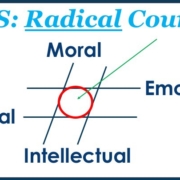The Harvard, MIT, and Penn Presidents show the Cost of Hypocrisy.
Hypocrisy is the destroyer of trust.
Only 21 percent of people trust leadership at work (Gallup), and do-as-I-say-and-not-as-I-do practices are at the heart of it. If you want to improve places in your organization that experience challenges with buy-in, accountability, and employee turnover, addressing hypocrisy is an excellent place to start.
Only a rare person, like Roman Roy in Succession, is genuine in their hypocrisy. The vast majority rationalize their inconsistencies and say-do gaps.
This problem was on powerful display as the presidents of Harvard, MIT, and Penn quibbled and prevaricated about whether on-campus calls for the genocide of Jews were ok.
If you listened to the Ivy League presidents’ responses in isolation, you might believe that they used the First Amendment to guide their responses.
The problem, of course, is hypocrisy.
The same presidents who enforce ideological speech codes, embrace woke racism (as John McWhorter terms it), use DEI officials as thought police, and whose institutions rank at the bottom for freedom of expression suddenly became First Amendment defenders when it came to antisemitism.
They probably did not intend to be hypocritical; they just were. They’ve spent so much time inhaling their own gas inside air-tight thought bubbles that they could not see the inconsistencies or imagined people were too blinkered to notice the double standards.
Do you think it can’t happen at your company?
Most workplace examples are more subtle but have the same toxic effect. Managers who:
- selectively enforce rules and personally flaunt them,
- take credit for their employees’ work but throw them under the bus when they make a mistake and
- ask their employees to “go the extra mile” but not do the same in return
These are common reasons your employees do not trust their supervisors.
In each case, the manager has made some rationalization to excuse the hypocrisy. Their direct reports and teammates see a pattern of behavior that damages trust.
To build trust and avoid hypocrisy, encourage your subordinates to follow the principle of reciprocity.
- Do I sanction myself for violating the rule? Change the rule if it’s bad, or correct the inconsistency. Everyone sees when you don’t walk the talk, and believing otherwise assumes that your employees are morons. Yes, they see that, too.
- Would I want my boss to treat me the same way? Start passing the credit and absorbing the blame. Give your boss some credit for recognizing that a positive environment boosts performance and that decent leaders take the hit when shortcomings occur. They won’t replace you with an employee you’ve bragged about.
- Do I go the extra mile for my employees? Do your employees believe that? How do you know?
Machiavelli said that no one knows the prince like the people. They don’t believe what they hear or read from you, only what they see. They see you – warts and all – more thoroughly than you imagine. They know when the emperor has no clothes.
Getting employees’ candid views is challenging because people fear retribution. The best way to elicit their sentiments is a combination of confidential questionnaires, focus groups, and individual interviews.
Then, you’ve got to let them know the action you plan to take, take it, and follow up.
Do you want to understand better how your workforce sees their managers? I can help you identify the say-do gaps that undermine trust and impede performance and implement practical actions that strengthen your company. Send me an email or schedule a call with me today
If you think investing in leaders is expensive, try paying the price of hypocrisy.










